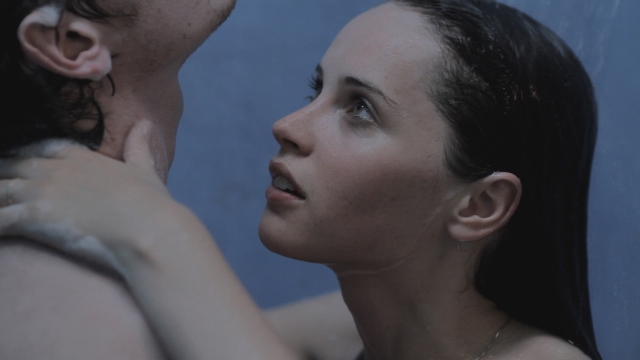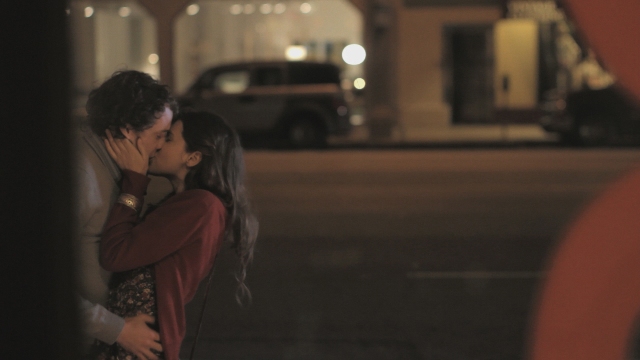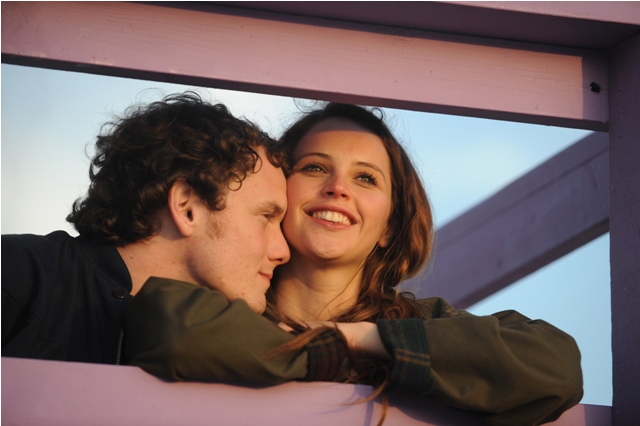CHICAGO – In anticipation of the scariest week of the year, HollywoodChicago.com launches its 2024 Movie Gifts series, which will suggest DVDs and collections for holiday giving.
Interview: Felicity Jones, Drake Doremus Aim For Authenticity in Festival Hit ‘Like Crazy’
CHICAGO – From the moment filmmaker Drake Doremus and actress Felicity Jones won big at the Sundance Film Festival, their film “Like Crazy” has been garnering a good deal of award season buzz. Jones’ star-making portrayal of Anna, a British college student attempting to sustain a long-distance relationship with her American boyfriend, Jacob (Anton Yelchin), has become the focus of media hype that threatens to drown out the film itself.
What makes the picture stand out from the crowd is its structure. As the helmer of indie gems “Spooner” and “Douchebag,” Doremus has a background in crafting richly layered character studies on a tight budget. “Like Crazy” sidesteps the moments audiences are used to seeing in a romantic narrative in favor of nuances and textures that convey much more than mere plot points. Doremus beautifully depicts the push and pull of a relationship struggling to stay alive against the odds. Each scene is guaranteed to overflow with moments of painful and poignant recognition for anyone who’s ever been haunted by a relationship that was, for one reason or another, unsustainable. Jones and Yelchin deliver career-best performances as they navigate their way through all the obstacles, while Doremus and cinematographer John Guleserian prove to have a masterful eye for detail. Hollywood Chicago spoke with Doremus and Jones about their efforts to stage authentic love scenes onscreen.
HollywoodChicago.com: While so many studio films leave their most interesting moments on the cutting room floor in order to advance the narrative, this film feels like a collection of deleted scenes. How did you and co-writer Ben York Jones go about finding those moments within the narrative?
Drake Doremus: We wanted to put together a structure that would allow us to execute something that really felt organic to the audience and resonated with them. Every time we sat down to write a scene, we asked, ‘How do we make this feel like it’s pushing the plot forward and driving the story, but at the same time, how do we create a parameter [around it] that enables us to create something that will flourish organically?’
You mentioned deleted scenes, and that is what the scenes are meant to play like. We don’t want you to feel like you’re getting plot. We want to subtly mix in story within the scenes so they feel like slice-of-life moments. There’s story peppered in, but it’s not hitting you over the head. Any time you need to convey a plot point, it’s not at the forefront of the scene. At the forefront of the scene are the performances and the genuine nature of the connection between the leads. Then the story is peppered in.

Felicity Jones delivers a star-making performance in Drake Doremus’ Like Crazy.
Photo credit: Paramount Vantage
HollywoodChicago.com: One topic that’s been brought up in many interviews is the audition tape that you [Felicity] submitted in order to win the role. Is it true that you had five days to prepare for the role?
Felicity Jones: Yes, it was a very quick process, because I think I spoke to you [Drake] on a Friday…
Doremus: And you were there the next week.
Jones: Yeah, so it was very rapid. I just read the script and loved it instantly. I read it in one sitting and it just felt so emotionally right, like every beat. And I love the fact, as you say, that it wasn’t about the more conventional plot points that you see in a love story. It’s about all the in-between bits—
Doremus: The gory bits.
Jones: They’re motivated through character. Then I spoke to you [Drake] on the phone. I don’t usually do this but I remember saying, “I really want to do this film.” Usually I’d be a bit more English and shy about it. [laughs]
Doremus: It was so weird because in our first conversation, we were bonding over “Breaking the Waves” and talking about the performances. I knew as soon as I hung up the phone that whatever she was going to send was going to resonate with me because we were on the same page about the tone and style of what we wanted to make. Immediately when I hung up the phone, I said, “I think this really may be it.” So I was very anxiously anticipating the tape. It wasn’t like I had a bunch of tapes and was like “I’ll pop this one in and see what happens. Aw great, another British actress.” [laughs] It was a big amount of anticipation on my behalf to get that tape. And then when I watched it and got to the end of the tape, I thought, ‘That was Anna.’
HollywoodChicago.com: The scene that you [Felicity] chose for your audition was the shower scene, which has practically no dialogue in the film. Why did you choose that scene, and what was it about her performance that made you [Drake] realize that she was the perfect fit?
Doremus: Well the fact that it was so bold, that she didn’t need dialogue to convey what Anna was going through at that moment. In the outline, it pretty much said, “They talk about her friend Sabrina who’s getting married.” It was this weird discussion about a friend that Jacob had basically barely met in London. That ended up going away, and the only line Anna says in the scene is, “That’s nice,” when the water is hitting her. It really has nothing to do with what’s going on in the scene. It’s all subtextual. She got that in the audition and that’s what’s so special about it. She made the bold choice not to speak, so literally the scene that she sent was just her hugging a stand-in that was in the shower with her. She was framed in close-up over his shoulder. She hugged him and didn’t say a word and it went on for minutes. It was everything but it was also nothing that it didn’t need to be. That’s what I needed out of my actors. I needed them to understand that it only needs to be what it needs to be. Anytime you go beyond that or try to add too much, it feels efforted and it doesn’t feel genuine.
Jones: Yeah, the key with this style of performance, because it’s so naturalistic, is you can see when it’s being forced or faked. As an actor, especially after having done more comedy or stage work, it was quite a challenge to do something so different. You have to feel everything, I think that’s the main thing. You have to make sure you let it happen and don’t try overlaying the performance with anything. It just has to come from inside.
Doremus: We just did another film together this summer. It’s amazing watching her grow in this process. I’m also growing in this process and we’re still learning. What’s interesting is that it now feels like second nature to let [the moment] come, let it happen and just trust that it will happen eventually, as opposed to going, “We gotta make this beat work.” As soon as you try to make a beat happen, it doesn’t feel organic. But as soon as you put yourself in the mindset to let it happen and let it come to you, it will eventually. In time, it will.

Anton Yelchin and Felicity Jones share a memorable kiss in Drake Doremus’ Like Crazy.
Photo credit: Paramount Vantage
HollywoodChicago.com: Do either of you feel that Anna and Jacob’s relationship was purely a victim of circumstance, or do you feel that it would’ve unfolded just the same without the problems caused by Anna’s Visa?
Doremus: Very interesting question. [pause] I genuinely believe that everything happens for a reason, especially in the case of these characters. Whatever happens to them in the end of the film is going to happen to them irrespective of anything getting in the way, because at the end of the day, they are connected by something that you can’t break and you can’t change by any set of circumstances. So in that sense, I really do believe that the relationship runs its course irrespective of what happens.
Jones: I feel that it’s a very modern relationship in the sense that they are trying to pursue themselves as individuals and have their own careers. It is a complicated relationship because they have their own lives and are very passionate about them. Where does the love fit in when you want to be self-defined at the same time? It feels as though there are huge amounts of love between them. I think they probably could’ve been together, but it’s just the way the world is now and the way men and women are. It’s just harder.
HollywoodChicago.com: I felt that the shower scene was poetically linked to the scene toward the beginning where Anna and Jacob look at each other through a window.
Doremus: Absolutely, there’s more than glass between them. [laughs]
Jones: Before they only had glass…
Doremus: And now they’ve got bulletproof invisible glass that’s five feet thick.
Jones: And neither of them can see it.
HollywoodChicago.com: Why did you choose to have Anna and Jacob’s first kiss in the film take place immediately after their dinner with Anna’s parents?
Jones: We did that a lot of times. He kept saying that it’s not passionate enough. “Go for it, really go for it!” Okay, okay! [laughs]
Doremus: That moment is about the anticipation you feel when you’re with someone that you want to be kissing every single minute, but you’re not able to for an hour and a half. It’s a magical moment that we can all relate to. That pent-up energy was more important to me than the first time when their lips met and how it felt.
Jones: It’s about the passion.
Doremus: Yeah, it’s the passion that’s pent up in them through the course of dinner. They’re young and they can’t show affection at that moment and it just keeps building and building.
Cinematographer John Guleserian and director Drake Doremus on the set of Like Crazy.
Photo credit: Paramount Vantage
HollywoodChicago.com: When shooting a film this intimate, the cinematographer must feel like another cast member.
Jones: Absolutely. John Guleserian’s presence was so important to us feeling as comfortable as possible. We luckily had a man who’s not only extraordinarily talented but has the ability to observe without being intrusive. That was the key really. He’s a substantial man—
Doremus: He’s 6’ 3”.
Jones: He would go behind the camera and become invisible. You never felt that his gaze was in any way judgmental. It was always welcoming and neutral.
Doremus: Very neutral. It had a very curious sort of feel, and I think that’s what the movie has.
Jones: His energy comes through the camera.
Doremus: Because of that, as a filmmaker, I don’t feel like we judge these characters. We just explain what they’re feeling, and I think that was largely due to how it was lensed.
HollywoodChicago.com: Guleserian has a way of creating artful compositions through the simplest of means. Has your [Drake’s] longtime collaboration with him created a sort of ESP between the two of you?
Doremus: ESP is a great way to put it. We’ve been working together for almost seven years now. We went to film school together and we really have developed something beyond shorthand. It becomes an intimate knowledge. Our tastes are so similar that we very rarely argue, but we do push each other. He pushes me to be the best I can be, and I push him to be the best he can be. There’s an honesty there and an understanding that we won’t let each other down. We will always push each other to do the best, and when it’s not right or it’s not the best it can be, we can call each other on it. That’s really exciting to have those little squabbles at times, because really at the end of the day, all that matters is what ends up on the screen.
Jones: And I think good things come out of having tension with the people that you work with. You’ve got to be arguing in order to produce something interesting. If everyone’s just agreeing with each other, you’re not going to push the boundaries.
Doremus: His eye is so unique. I think he’s an incredibly unique DP.
Jones: But you’re right. It’s that combination of getting the scene, but also getting at something more beautiful beyond what’s going on in front of the camera, which is hard to achieve with that style.
HollywoodChicago.com: And Lars von Trier is renowned for those sorts of compositions.
Doremus: Oh yeah, he’s a master of that, an absolute magician.

Anton Yelchin and Felicity Jones star in Drake Doremus’ Like Crazy.
Photo credit: Paramount Vantage
HollywoodChicago.com: You’ve said in interviews that roughly two percent of what you filmed made the final cut. What onset improvisations are you particularly glad made it in?
Doremus: There’s one where Anton’s talking about a boat named the Ahi.
Jones: I’m so glad that made it. I always thought you’d cut that out.
Doremus: It was so real and it’s such a charming bit. It’s my favorite moment of Anton in the film. There were a bunch of different takes where Jacob tried breaking Anna out of her funk. She has to leave the next day, and it was such a wonderful moment that Anton created. When he first saw it, he was like, “Oh man, you used the Ahi!”
Jones: It’s the combination of his humor and the way he looks at her, where you can tell that he really loves her.
Doremus: It’s the longing—he’s losing her and he feels like he’s losing her.
Jones: And he’s trying to compensate.
Doremus: He does it in such a magnificent way. He’s making an effort but not too much. There isn’t desperation [in his actions], but he needs her and loves her and wants her. It’s a beautiful moment.
HollywoodChicago.com: Was there an effort to cast someone who was similar to you in the role of Jacob? I mean, the hair, obviously…
Doremus: If they don’t have curly hair, I’m not casting them. [laughs] Anton’s energy is similar in a way and his understanding of the character was spot-on so it was kind of a no-brainer. He’s 22 years old and as far as actors in their early ’20s in Hollywood are concerned, he’s one of the best. So after just sitting down and talking to him for three hours, I was like, ‘You’re Jacob.’
Jones: I just think he’s an exciting actor because he does such a wide range of work. He keeps challenging himself all the time and we share a sense of humor that comes through Anna and Jacob.
Doremus: I think the most special thing about the chemistry is the intimate understanding of how to make each other laugh. At the end of the day, in order to portray a genuine relationship on camera, that’s one of the most fundamental things that has to occur.
Jones: And it’s being able to listen, truly listen to each other. There are not many people who you can really listen to. We found a way of being able to listen well to each other, which is so important for improvisation.
Doremus: In cutting the film, it was so important to hold on them listening to each other so the audience has the understanding that they’re really connecting.
 | By MATT FAGERHOLM |


